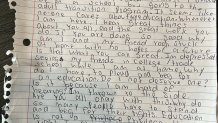For most students, a high school diploma signifies a step into their future. For Ibrahim Barrie, who is hard of hearing and diagnosed with special learning disability, his recent diploma from Leigh High School in San Jose stopped his future in its tracks, he and his family say.
Ibrahim’s hearing condition and special learning disability are documented in his individual education plan, or IEP, with the school. An IEP is a legal document a school follows so a student with certain disabilities can receive personalized education.
Two days before his graduation in June 2024, his mother, Isatu Barrie, says she received a phone call from Santa Clara County Office of Education’s (SCCOE) special education principal.
“She’s like, ‘I have bad news…I’ve been trying to fight it. I spoke with the [county] lawyers,’” Isatu said. “‘Ibrahim is not getting any certificate of competition. He’s getting a diploma.’”

A high school certificate or certificate of completion is something a student receives when he finishes high school but does not meet all the requirements to graduate. Ibrahim and his mother were expecting that certificate because they say it would’ve enabled him to receive services to attend post-secondary adult school. The program would provide additional life skills and vocational training. Ibrahim’s dream is to work with automobiles, he says.
However, according to SCCOE’s letter that the family received shortly after graduation, the diploma meant Ibrahim was now “no longer eligible for special education services through the district of SCCOE.”
Local
“I was scared because if I don’t go to the adult school program, what am I going to do for my future,” Ibrahim signed in an interview with the NBC Bay Area Investigative Unit.
College isn’t an option he says. Even though school officials wrote that he earned a high school diploma, there’s a problem.
Get a weekly recap of the latest San Francisco Bay Area housing news. Sign up for NBC Bay Area’s Housing Deconstructed newsletter.
Ibrahim struggles with basic reading skills.
“The system failed him…How can an 18-year-old read at a second-grade level?” he mother said.
And how can a high school student who only reads at a second-grade level have a high school transcript filled with A’s and B’s?

One of Ibrahim’s former Leigh High School teachers agreed to speak with the Investigative Unit. She asked to remain anonymous to avoid retaliation.
“We failed him,” she said. “Having worked with him, I know that. I know that he’s reading at a 2nd, 3rd grade level.”
According to the Santa Clara County Office of Education’s letter to Ibrahim and his mother, the county office decided to issue him a diploma based on his IEP documents, assessment reports and other factors.
With his mother’s permission, NBC Bay Area shared several of those same documents with two separate special education advocates who do not know Ibrahim. They say they found red flags.
“[Ibrahim] was indicated to have passed Algebra 1, but when looking at the assessment results, it looks like he was only testing around a fourth-grade level at most for math,” said Taylor Kohn with Aspire Advocacy. “I would be curious to know how a young man who's only testing at a fourth grade level passed Algebra 1.”
Advocates Taylor Kohn and Alicia Tucker say school administrators seem to be looking mainly at Ibrahim’s transcript, and not at Ibrahim.
“When you see a transcript, you see the name of a class and a letter grade. You do not see anything additional like modifications happening which are noted in the IEP,” Kohn said.
With an IEP, Kohn and Tucker say, classes are adjusted. Ibrahim’s performance baseline was different from his peers. For instance, if earning an A grade in English typically means being able to read a novel, for Ibrahim, it doesn’t mean the same thing. A teacher is directed by Ibrahim’s IEP to pass him if he meets his own individualized baseline.

“His goal may be just to write two sentences towards a topic. And if he masters those goals, he makes an A in his class,” said Tucker.
The problem is, those A’s and B’s Ibrahim earned for his modified lesson plans ended up on his transcript. The fact that the classes were modified didn’t always, according to the Investigative Unit’s review of Ibrahim’s documents.
Tucker says most of his teachers probably were not aware the grades they gave him would results in denied services after graduation. She says she’s seeing this problem with special education students nationwide.
“Because of the lack of funding and the teacher shortage,” Tucker said. “They're just forgotten. They're overlooked.”
Ibrahim says he’s sharing his story for those students.
“I will like them to be supported, teach them, help them no matter what so they don't struggle in the real life because if they do, they will be...homeless,” he said.
Being homeless. Tearfully, Ibrahim said that is his biggest fear.

NBC Bay Area reached out to Leigh High School and SCCOE school leaders. They declined interviews. SCCOE provided a statement saying federal law “restricts [its] ability to disclose specific details about any student’s educational experiences or conversations related to their education.”
The county office has offered Ibrahim four years of adult school, transportation and sign language services. He and his mother would have to sign a contract agreeing that he earned diploma and is no longer entitled to any further special education, including an IEP, while at adult school. Ibrahim and his mother have not signed the contract because they don't agree with the conditions.
For six months now, Ibrahim has been at home regressing, his mother says, receiving no vocational school or training to be a mechanic.
She says the county has since offered Ibrahim transportation to adult school and referred him to other state services. However, the family says they want to hold the county accountable for Ibrahim’s education to prevent this situation from happening to another special education student.
Candice Nguyen is the investigative reporter on this story. If you have a questions or another investigative tip, email her at candice.nguyen@nbcuni.com.



